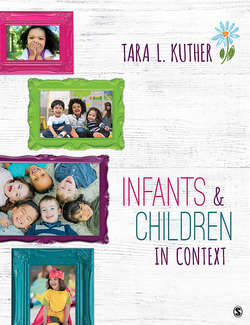Читать книгу Infants and Children in Context - Tara L. Kuther - Страница 264
На сайте Литреса книга снята с продажи.
Substage 2: Primary Circular Reactions (1 to 4 Months)
ОглавлениеDuring the second substage, infants begin to make accidental discoveries. Early cognitive growth in the sensorimotor period comes through engaging in circular reactions, the repetition of an action and its response. Infants learn to repeat pleasurable or interesting events that originally occurred by chance. Between 1 and 4 months, infants engage in behaviors called primary circular reactions, which consist of repeating actions involving parts of the body that produce pleasurable or interesting results. A primary circular reaction begins by chance, as the infant produces a pleasurable sensation and learns to repeat the behavior to make the event happen again and experience the pleasurable effect again. For example, an infant flails her arms and accidentally puts her hand in her mouth. She is surprised at the outcome (her hand in her mouth) and tries to make it happen again. Therefore, the infant repeats the behavior to experience and explore her body.
In the second substage (1 to 4 months), infants discover that they can control their bodies and repeat the behavior to experience and explore their bodies. This infant enjoys repeatedly grasping her feet.
©iStockphoto.com/NickyLloyd
